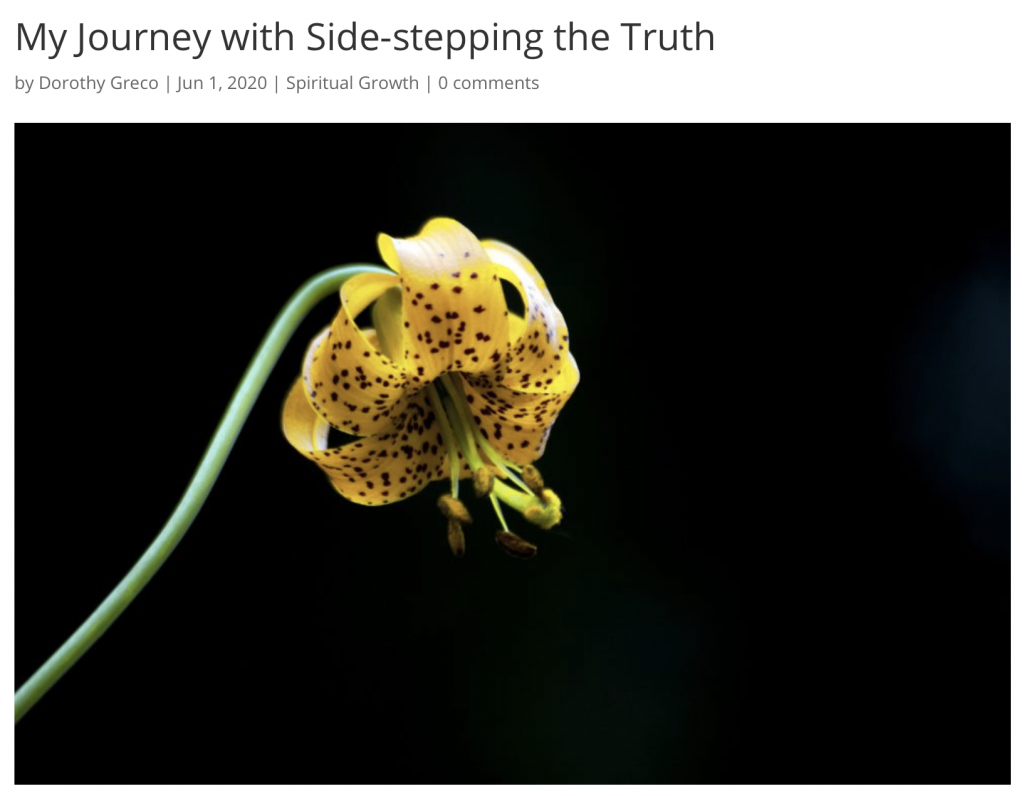
Confession is humbling, embarrassing, and at times, even mortifying. So why bother? Wouldn’t it be easier to simply hide our sins and pretend all is well? Denial might be easier, but if we want to get free from sin, confession needs to become a regular part of our lives.
Confession helped me break my 40-year habit of lying. I never cheated the IRS or padded my resumé, but I did lie to cover up my father’s alcoholism and to avoid conflict. If I feared being judged because I wasn’t up to date on the topic of conversation in a social setting, I would fake it instead of just saying, “I don’t know anything about that. Can you summarize it for me?”
Fast forward to the early years of my marriage. When my husband asked me if I was angry or upset, I side-stepped the truth without hesitating. I couldn’t see this at the time but my habit of lying prevented others from fully knowing me.
It was only when I began to read the Bible more intently that I started to realize lying and following Jesus were incompatible because God hates lying (see Prov. 11:1, Eph. 4:25, Col. 3:9). Once convicted I needed to change, I told my husband I planned to confess to him every time I lied until I stopped. The more I confessed, the less I was tempted to lie. It took about a year of faithfully confessing but then I was free. Confession did what nothing else could.
What is confession and why do we avoid it?
Confession is an honest, humble admission of the ways we have fallen short of God’s commands. It’s about our failures. While we can—and should—confess to God, the practice of confessing to another human being is what gives us the most leverage to break free from sin. Hence the passage “confess your sins to each other so that you might be healed” (James 5:16).
Few of us like to admit our failures. This is particularly true in a culture like ours where image is everything. The Apostle John’s words are just as apropos today as they were two thousand years ago when he wrote them: “If we claim we have no sin, we are only fooling ourselves and not living in the truth” (1 John 1:8). In other words, we won’t grow if we don’t confess because denial thwarts transformation.
It all comes down to what we want. Is our primary goal to get others to like us? To avoid conflict at all cost? To appear flawless? Or do we really want to grow into mature believers?
What should we confess?
Unless we’re planning a surprise party, anything we’re tempted to hide needs to be confessed. My husband and I routinely confess obvious sins (e.g., harshness or angry outbursts with our kids), as well as the easily-concealed sins such as greed, bitterness, sloth, and gluttony. Other than God, no one would ever know when I’m coveting my neighbor’s house, automobile, vacation, or salary. Likewise, if I’m careful, I can easily conceal when I turn to food for comfort. As I write in Making Marriage Beautiful, “Most of us avoid the jail-worthy sins such as tax fraud and drug peddling but silently struggle with the stealthy sins of the heart. . . . No one is going to call 911 on us for these sins, but they are not without cost and should not be omitted in our confessions.”
I’ve also gotten in the habit of confessing temptations. That means when I’m tempted to spend money we don’t have or pop off at someone on the internet, I’ll communicate that to my husband as a form of accountability. Normally, that stops me in my tracks.
How to confess
Through my personal and pastoral care experiences, I’ve learned a few things about how to confess.
- Take ownership rather than blaming or excusing. In terms of causality, what was going on prior to the sin matters (e.g., you just got fired or you were lonely) but when you confess, avoid contextualizing. The confession should take 30 seconds. The conversation after that might take two hours.
- Be specific. Being vague empowers sin. Admitting, “I watched online porn for three hours after you went to bed on Saturday night” is better than, “I watched some things I shouldn’t have the other day.” You can skip the gory details.
- After you confess a sin that has affected someone, listen well and choose to be empathetic and humble. You could ask, “How did my sin affect you?” Try not to get defensive—even if the other person becomes angry.
- Apologize fully, as in, I’m sorry for being harsh last night at dinner versus a petulant, Sorry! a la Carol Burnett.
- When you are hearing someone’s confession, hold it in confidence. What is revealed in a confession should not become fodder for casual conversation the next day. (Different rules apply if the person confessing reveals harm done to minors or suicidality.)
Confession not only helps us to stop sinning but also allows us to become fully known by others. When our friends and family see us for who we truly are and love us anyway, it’s powerful. In fact, that’s what it looks like when the kingdom of God breaks into our world.
This article originally appeared at The Redbud Post on June 1, 2020.
